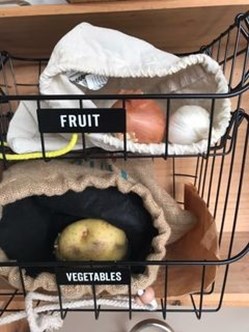How I plan to cut single use packaging and my food waste - Syd
Wednesday 17 February 2021
Although I try to only buy what I need for the week, inevitably some food is wasted because it just does not last long enough. The pandemic has changed the way many of us shop, with people stocking up for longer and making fewer trips out.

Recently I learnt that households across the UK are believed to waste over 6 million tonnes of food, with 70% of it thought to be perfectly edible. Thankfully, there are ways to keep food fresher for longer (that doesn’t involve single use plastic packaging!)
These are the steps I’ve been taking for buying fresh food
- Firstly, try to buy as much fresh food loose from local grocers, it means supporting local and usually means the produce is seasonal and hasn’t travelled as far.
- Buy loose and bring your own produce bags. Many supermarkets are working to ensure their loose produce matches the cost of their package
 d options. Buying loose means only buying the amount you really need.
d options. Buying loose means only buying the amount you really need.
- Use the deli counter to get the exact portions you really need and ask if you can take it away your own container or wax wraps
Certain fresh foods can last much longer if stored properly. Here are some tips for the most popular ones:
- Keep carrots in a container in the fridge, filled with water that covers them completely. I use a glass container with a bamboo lid. Change the water every few days and they should stay crunchy and fresh for about a month. The same method can be used for celery for a couple of weeks.
- Onions last longer out of the fridge but in a cool dry, dark cupboard. Onions need to breathe so don’t trap them in a plastic box/bag. A paper bag would be a good choice.
- Potatoes like the same environment but keep them away from onions which can encourage them to sprout and expire early. Keep white potatoes and sweet potatoes separate from each other too. The reason behind this is that certain fruit and vegetables produce chemicals that speed up the ripening process of one another.
- Tomatoes, cucumbers (both actually fruit) and stone fruits taste best out on the side at room temp, you may want to use a mesh bag to keep them away from flies.
- Despite the handy egg and milk carton holder some fridges have in the door, it is best not to have dairy or eggs there as the door is the warmest part.
- Bread keeps best if frozen and can go stale quickly in a fridge which removes moisture.
- Rinse berries in a 1 part lemon juice 3 parts clean water solution before refrigerating. The acid in the lemon juice will remove mould spores and keep them fresher for longer without affecting the taste.
- If you want your food to last much longer, the majority of fresh food can be frozen at home. Freeze food as early as possible, blanching first.
- Remember that best before dates on fresh produce are only a guideline, a few days ‘out of date’ does not mean that the food is unsafe or inedible. Use your senses, look, smell and taste a little bit before chucking out food. Over ripe fruits can be used in smoothies or baked in banana bread for example.
FRIDGE AND FREEZER EFFICENCY CAN MAKE YOUR FOOD LAST LONGER AND REDUCE THE ENERGY USED, THUS REDUCING YOUR CARBON FOOTPRINT.
- Freezers use less energy when they’re full, but the fridge needs air circulation so don’t pack it too full.
- Match foods to the right microclimate. The coldest part of the fridge is towards the back and as cold sinks the bottom shelf is the coolest. The fridge door is the warmest area.
- Don’t put hot food straight in, your fridge will need to work harder.
- Don’t stare into the abyss, trust me there’s no new food and the fridge has to work harder every time you open the door.
- Use a thermometer inside. Fridges shouldn’t be set any lower than 5ºC, while freezers should be -18ºC. Changing the temp settings on your fridge doesn’t necessarily mean that your fridge reaches that temperature. You probably don’t need your fridge to be set to the coldest setting.
- Avoid having your fridge near a heater or an appliance that generates heat such a tumble dryer. The hotter and less ventilated the air around a fridge the harder it has to work.
- Dust the coils at the back of your fridge a few times a year to keep them working efficiently.
If you would like to share your ideas and tips please email [email protected] or sign up and become a Climate Change Champion